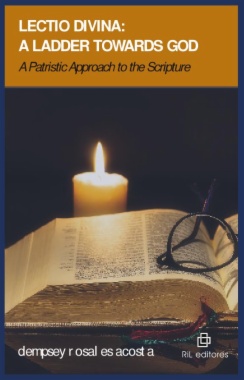Lectio Divina as a Ladder towards God is a theological work of re-sourcement. As suggested by the word itself, re-sourcement is a return to applying theology to the original sources found in Christianity, namely Scripture, Tradition, the Church Fathers (i.e., Patristics), and Apostolic Teachings. Lectio divina is, therefore, an ancient practice of prayer and hermeneutics with its roots in early Hellenistic Christian and Jewish traditions which takes us directly to the heart of the Christian tradition by drinking directly from the fresh spring of God’s living Word. Consequently, the author articulates this tradition in three parts. Examining this influential history, the first part of the book expounds the Jewish notion of PaRDeS, the work of Origen of Alexandria, the writings of different patristic authors, and Guigo the Carthusian. The second part of the book provides a careful description of each theological moment of the Scala Paradisi of Guigo: lectio, meditatio, oratio, et contemplatio, with their respective implications and recommendations for an effective lectio, whether practiced individually or in community. The third part presents three cases of how lectio divina can be applied to the sacred text, helping to discover different semantic levels of one word, phrase, expressions, themes or episodes of Scripture. The study cases are based on one single word from Mark’s Gospel, i.e., the verb horáō (ὁράω: to see) in Mk 1:10; 1:16-20; 2:14.
- Cover
- Title page
- Copyright page
- Index
- Abbreviations
- Foreword. Sr. Chau Nguyen
- Introduction
- 1. Lectio Divina: a historical journey
- 2. Lectio Divina and the Christian Family
- 3. Configuration of the present study
- Part I. The World of Lectio Divina
- Chapter I. Searching the Meaning
- 1. Senses of the Scripture
- 2. The Literal Sense or Literal Interpretation of Scripture
- 3. The Allegorical Sense or the Symbolical Interpretation of Scripture
- 4. The Tropological Sense or the Morally Edifying Interpretation of Scripture
- 5. The Anagogical Sense or the Mystical Interpretation of Scripture
- Chapter II. A practical application of the Four Senses of Scripture
- 1. Reading Hosea 2:4-19 as a practical illustration
- 2. Corollary
- Chapter III. Definition and History of Lectio Divina
- 1. Lectio Divina: a Patristic journey
- 2. Lectio Divina in the monastic life
- Chapter IV. The spiritual ladder
- 1. Steps of Lectio Divina according to the Tradition
- 2. Lectio: reading Scripture with unarmed poverty
- 3. Meditatio: a studious searching with the mind to know what was previously concealed
- 4. Oratio: the dialogue with God
- 5. Contemplatio: the lifting up of the heart to God and tasting some of the heavenly sweetness
- 6. Operatio: the Christian life as a prayer for action
- Part II. The Practice of Lectio Divina
- Chapter V. Useful Procedures
- 1. Practical Steps
- 2. The Statio
- 3. Time
- 4. Participants
- 5. The Holy Page or Sacra Pagina
- 6. Rule of Spirituality: the active participation of the Holy Spirit
- Chapter VI. Listening to the voice of God through the living Scripture
- 1. Lectio as a time for listening
- Chapter VII. Discovering what God wants to tell me
- Chapter VIII. My response to God: a spiritual dialogue
- Chapter IX. Waiting and resting in God
- Chapter X. Living according to God
- Part III. Lectio Divina of Horáō. Three cases of the seeing of Jesus in Mark’s Gospel
- Chapter XI. Jesus’ seeing at the beginning of his Public Ministry
- 1. Premise
- 2. The Baptism of the Lord: Lectio of Mark 1:10
- a) Pericope: Greek text
- b) Translation
- c) Philological Notes: helpful keys for the literal sense
- 3. Meditatio et Actio
- Chapter XII. Sequela Christi
- 1. The call of the first disciples: Lectio of Mark 1:16-20
- a) Greek text
- b) Translation
- c) Philological Notes: helpful keys for the literal sense
- 2. Meditatio et Actio
- Chapter XIII. The calling of Matthew
- 1. The calling of Levi: Reading the text of Mark 2:14
- a) Greek text
- b) Translation
- c) Philological Notes: helpful keys for the literal sense
- 2. Meditatio et Actio
- Bibliography

